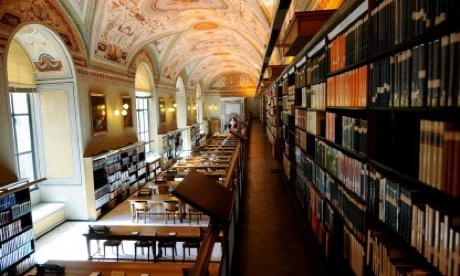The 565-year-old Vatican Apostolic Library is going digital. More than 80,000 manuscripts and 8900 incunabula (books or texts printed before 1501) will be preserved in digital format.
The process, which will take nine years, has been made possible by the EMC Corporation, an international information technology company, making available 2.8 petabytes of storage. One petabyte is equivalent to a million gigabytes.
Vatican librarians are anxious to preserve some of their priceless older works in digital form because the originals are subject to deterioration from age and repeated handling.
The digitised Vatican collection will include old Hebrew and Greek manuscripts and early illustrated copies of the New Testament, among other items.
“The Apostolic Library contains some of the oldest texts in the world that represent a priceless legacy of history and culture,” said the prefect of the library, Monsignor Cesare Pasini.
“It’s very important that these documents are protected, and at the same time made available to scholars around the world. Thanks to the generosity and expertise of supporters such as EMC we are able to meet these goals, preserving a treasure-trove of rare and unique texts in a format that will not suffer from the passage of time.”
The Vatican library, established in 1448, is one of the oldest in the world.
Some of the most notable documents to be digitised include the Sifra, one of the oldest extant Hebrew codes which was written somewhere between the end of the 9th and the middle of the 10th century, as well as Greek testimonies for the works of Homer, Sophocles, Plato and Hippocrates.
“Where once knowledge and information would have been stored on the page, facilitated by the scriptoria or later the printing press, today EMC serves the same purpose through our storage technologies,” said Marco Fanizzi , country manager for EMC Italy.
“The collaboration with the Apostolic Library is an incredibly important project and will provide future generations with access to knowledge and insight that may otherwise have been lost.”
Sources:
Image: The Next Web
